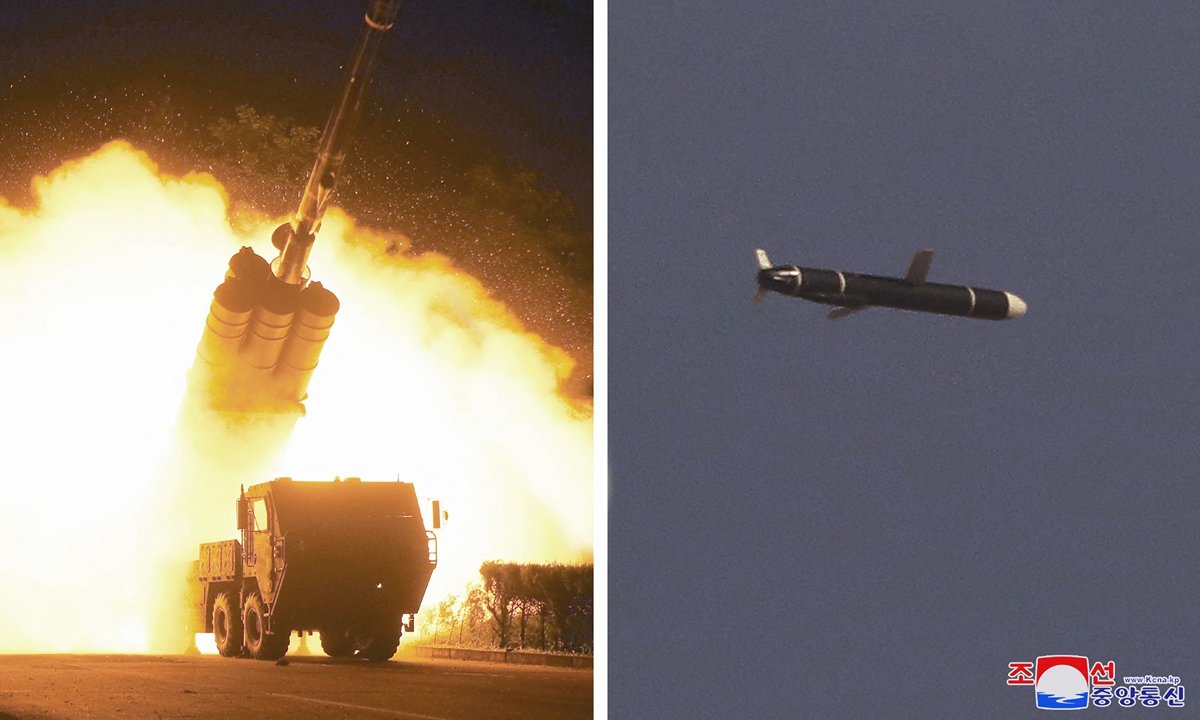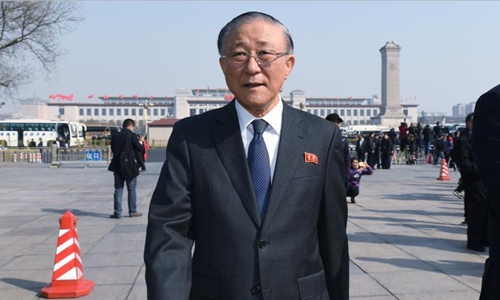
North Korea's official Korean Central News Agency (KCNA) on Monday released a photo showing the test of new type long-range cruise missiles on Saturday and Sunday. Photo: AFP
North Korea conducted successful tests of new type long-range cruise missiles over the weekend, the state media of the country said on Monday, with the US accusing Pyongyang of "threatening" neighbors and the international community. But China urged them to maintain restraint and start talks, to push the political solution progress for the Korean Peninsula issue.
North Korea successfully test-fired new type long-range cruise missiles on Saturday and Sunday. The missiles are "a strategic weapon of great significance" and flew 1,500 kilometers before hitting their targets and falling into the country's territorial waters during tests on Saturday and Sunday, the Korean Central News Agency (KCNA) said.
Chinese Foreign Ministry spokesperson Zhao Lijian said at a routine press conference on Monday that "We call on relevant parties to exercise restraint, meet each other half way, actively conduct dialogue and engagement, and follow the 'dual-track' approach and take phased and synchronized actions to continuously advance the political settlement of the Korean Peninsula issue."
The US military's Indo-Pacific Command (INDOPACOM) said earlier that it was aware of the reports and was coordinating with its allies and partners. "This activity highlights (North Korea's) continuing focus on developing its military program and the threats posed to its neighbors and the international community," INDOPACOM said in a statement.
North Korea's cruise missiles usually generate less interest than ballistic missiles because they are not explicitly banned under UN Nations Security Council resolutions, and some Western analysts said the new missile could be the first such weapon with a nuclear capability owned by North Korea, Reuters reported on Monday.
In the test flights, the missiles traveled for 7,580 seconds along an oval and pattern-8 flight in the air above the territorial land and waters of North Korea and hit targets 1,500 kilometers away, the KCNA report said.
North Korea's new cruise missile seems to be a traditional, subsonic cruise missile comparable to the US' Tomahawk, observers said. The Tomahawk Block IV, the latest upgrade to the Tomahawk series, has a range of 1,600 kilometers, according to the US-based Center for Strategic and International Studies.
Different from ballistic missiles that fly with high trajectories at very high speed, cruise missiles usually fly with low trajectories at lower speed, so they could hopefully evade radar detection, analysts said.
The latest test highlighted the steady progress in Pyongyang's weapons program amid a gridlock over talks aimed at dismantling the North's nuclear and ballistic missile program in return for US sanctions relief. The North Korea-US talks have stalled since 2019 as the previous administration of Donald Trump failed to build mutual trust with Pyongyang and showed no sincerity to encourage North Korea on denuclearization.
After Joe Biden took office, the new administration has been treating the issue much more passively. "Pyongyang's move is to remind the US that it still has a job to do in the peninsula, and not to even think about ignoring North Korea," Lü Chao, an expert on the Korean Peninsula issue at the Liaoning Academy of Social Sciences, told the Global Times on Monday
The peninsula issue used to be a hot topic for China-US talks as the both sides share some common grounds and have necessity to cooperate. But when the Biden administration sent its officials to talk with their Chinese counterparts, US officials rarely mentioned the topic, and this proves that the US wants to ignore the problem and avoid responsibility, Lü noted.
So when Pyongyang does something to remind Washington, it's entirely reasonable, and the US shouldn't let the issue remain unresolved forever, Lü noted.



